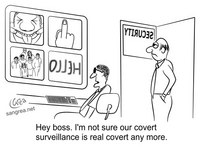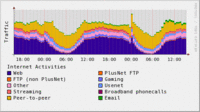It does seem to clarify some of the points made by the panelists.
Packet Shaping
February 23, 2010
February 22, 2010
December 19, 2007
December 17, 2007
December 07, 2007
November 26, 2007
November 20, 2007
October 20, 2007
August 21, 2007
June 18, 2007
Search
Categories
- Advertising
- Antitrust
- Applications
- Art
- Books
- BPL
- Broadband
- Cable
- Capacity
- Censorship
- Communication
- Competition
- Consolidation
- Content
- Copyright
- Corruption
- Current Affairs
- Devices
- Distributed Participation
- DSL
- Duopoly
- Economics
- Education
- Emotion
- Espionage
- Film
- Filtering
- Food and Drink
- FTTH
- Games
- Government
- History
- Hosting
- Indians
- Innovation
- International acces
- Internet Access
- Internet freedom
- Internet History
- Internet Speed
- IP over TV
- IPTV
- Law
- Malware
- Management
- Marketing
- Military
- Monopoly
- Municipal Access
- Music
- National Security
- Net Neutrality
- Opportunity
- Packet Shaping
- Piracy
- Poetry
- Politics
- Postal Service
- Press
- Principles
- Privacy
- Public Policy
- Public Safety
- Radio
- Regulation
- Religion
- Research
- Rural Access
- Science
- Search
- Senior Access
- Society
- Spectrum Allocation
- Sports
- Stakeholders
- Stifling
- Telephone
- Television
- Throttling
- Travel
- Video
- Violence
- VoIP
- Voting
- Web/Tech
- Weblogs
- Wireless Internet
- Wiretapping
Books
Om Malik: Broadbandits: Inside the $750 Billion Telecom Heist
- Momentum: Igniting Social Change in the Connected Age: Alison Fine
- John S. Quarterman: The Matrix: Computer Networks and Conferencing Systems Worldwide
Yochai Benkler: The Wealth of Networks: How Social Production Transforms Markets and Freedom
John S. Quarterman: Risk Management Solutions for Sarbanes-Oxley Section 404 IT Compliance
Chris Willman: Rednecks and Bluenecks: The Politics of Country Music
Blogs
- policyblog - Verizon FiOS Community
- Cisco's High Tech Policy Blog - Cisco High Tech Policy Blog
- Google Policy Blog
- Jonathan Rintels
- Christopher Herot
- Tom Evslin
retired serial ceo whose historic murder mystery set in the Internet bubble and rubble is serialized online at hackoff.com - Gaige Paulsen
- David Weinberger
- Susan Crawford
- David S. Isenberg








